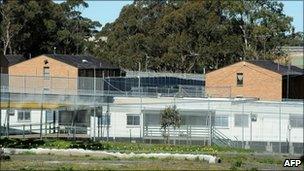Australia asylum deadlock deepens as talks break down
- Published

Australia's mainland and Christmas island detention centres are increasingly crowded
Talks between the Australian government and opposition on asylum seekers have broken down in a deepening deadlock.
Immigration Minister Chris Bowen accused the opposition of not making ''a single constructive contribution", Australian media reported.
His counterpart, Scott Morrison, said talks failed because the government did not address concerns about a plan to swap refugees with Malaysia.
A court ruled last year that the plan was unlawful.
The ruling Labor Party and the opposition Liberal Party have been locked in negotiations over the fate of increasing numbers of asylum seekers arriving by boat for months.
Australia detains all those who arrive by boat, external, some on the mainland and some at the Christmas Island detention centre.
The latest round of talks began in December 2011 to reach a deal to resume offshore processing.
The Liberals wanted to reopen a processing centre on the Pacific island of Nauru - a policy that was heavily criticised by the governing Labor party.
But the government has made some concessions. In a series of letters exchanged between Mr Bowen and Mr Morrison over the last month, released to media by the latter, it was revealed that immigration officials had visited Nauru this month to inspect facilities there.
This reinforced an offer by the government to reconsider opening the processing centre in exchange for opposition support for the ''Malaysia swap'' plan.
Mr Morrison rejected this possibility, saying that the opposition was not prepared to give up its longstanding principles "as a condition for the government to embrace the Coalition's proven measures".
'Opposition hypocrisy'
In his latest letter Mr Bowen hit out at the opposition, asking if it knew how to fund the reopening of the centre, which would take "an absolute minimum of three months".
It would cost about A$1.68bn ($1.76bn, £1.13bn) to house 750 asylum seekers there, he said, and rebuilding the facilities would cost at least another A$316m.
Under the ''Malaysia swap'' plan, Australia would have sent 800 asylum-seekers who arrived by boat on to Malaysia and would have received 4,000 refugees in return over four years.
But last year, a court ruled that Malaysia - which has not signed UN refugee conventions - did not offer adequate protection.
According to Australian media reports, the government had also offered to include additional safeguards against human rights abuses into its Malaysia deal.
These included providing the asylum seekers with a "hotline" to UNHCR staff and support in medical care, counselling and contact with their families.
The government also said it was willing to set up a parliamentary committee to monitor the treatment of asylum-seekers sent to Malaysia, Papua New Guinea or Nauru.
However, these still did not meet the demands of the opposition.
Mr Bowen also said that the government would not adopt the opposition policy of turning boats back at sea. This would endanger the lives of both the asylum seekers and Australian navy personnel, he added.
The government accused the opposition of hypocrisy in rejecting Malaysia as a destination for asylum seekers, but at the same time, being willing to turn boats back to Indonesia.
- Published19 September 2011
- Published19 December 2011
- Published8 August 2011
- Published25 November 2011
- Published2 November 2011